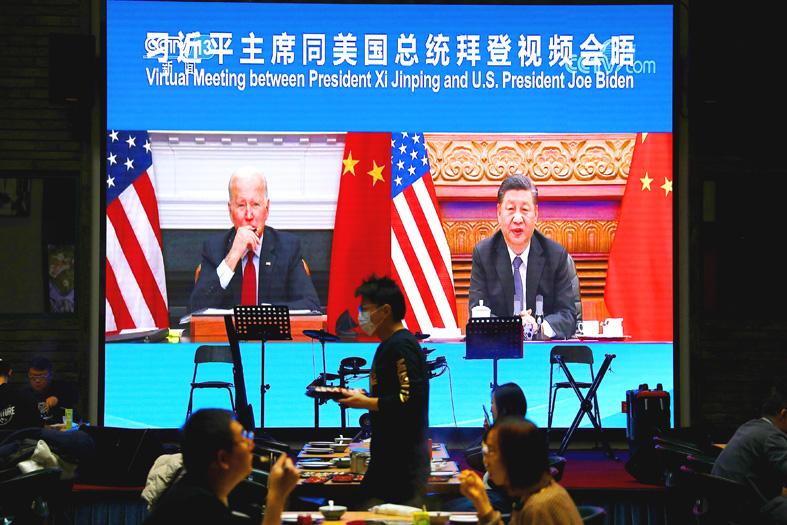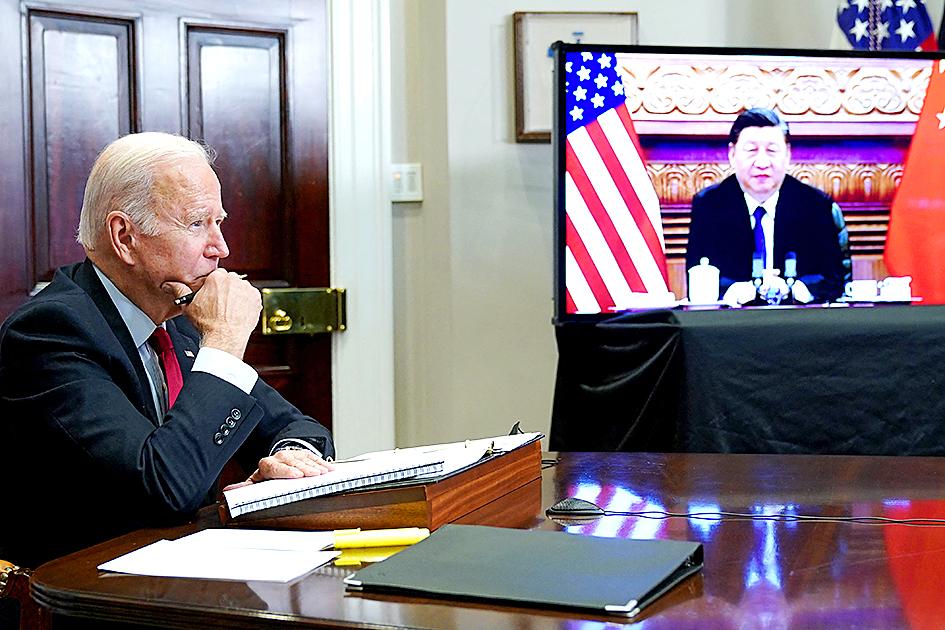US President Joe Biden and Chinese President Xi Jinping (習近平) traded strong warnings on the future of Taiwan at a virtual summit meant to establish “guardrails” against conflict between the rival superpowers.
The video-link summit, which took place late on Monday in Washington and early yesterday in Beijing, lasted a “longer-than-expected” three-and-a-half hours, a senior US official told reporters.
“The conversation was respectful and straightforward,” said the official, who asked not to be identified.

Photo: Reuters
While the goal was to settle an increasingly volatile relationship between the giant economic and geopolitical competitors, tension over Taiwan loomed large.
Chinese state media reported after the summit that Xi cautioned Biden that encouraging Taiwanese independence would be “playing with fire.”
“Some people in the US intend to ‘use Taiwan to control China.’ This trend is very dangerous and is like playing with fire, and those who play with fire will get burned,” he was quoted as saying by Xinhua news agency.

Photo: AFP
The White House readout after the summit was considerably more measured, but between the lines, Biden’s pushback against Beijing’s increasingly aggressive posture toward Taiwan was clear.
“On Taiwan, President Biden underscored that the United States ... strongly opposes unilateral efforts to change the status quo or undermine peace and stability across the Taiwan Strait,” the White House statement said.
The statement reiterated longstanding US policy that does not recognize Taiwan’s independence, but supports its defense.
There was “extended discussion of Taiwan” during the summit, the official said.
Biden also raised “concerns” over wider issues of human rights abuses and mass repression against the Uighurs in Xinjiang.
The White House emphasized it did not expect — or get — any concrete changes out of the summit. Rather, the goal was to build on earlier contacts with Xi to manage a relationship that is too big to fail.
Speaking from the White House to Xi on a television screen, Biden said it was their “responsibility as leaders of China and the United States to ensure that the competition between our countries does not veer into conflict, whether intended or unintended.”
“We need to establish some common sense guardrails,” he said.
Instead, the aim should be for “simple, straightforward competition,” Biden said, promising a “candid” discussion.
Xi called Biden “my old friend,” but said their countries had to work more closely.
“We face multiple challenges together. As the world’s two largest economies and permanent members of the UN Security Council, China and the United States need to increase communication and cooperation,” he said, speaking through an interpreter in brief public remarks, before they went behind closed doors.
Both leaders emphasized the need to work together on major global issues, especially COVID-19 and climate change.
“A sound and steady China-US relationship” is needed “for safeguarding a peaceful and stable international environment,” Xi said.
Analysts do not see any definitive impact from the meeting.
“It appears they exchanged views about everything under the sun, but announced no decisions or policy steps,” said Scott Kennedy, a China expert at the Center for Strategic and International Studies.
“Perhaps that will be revealed in the coming days, but if not, this ended up being a recitation of both sides’ basic positions. They seem to agree that the relationship needs to have some guardrails and stability, but they don’t agree about how to get there,” he said.
Daniel Russel, who served as the top US diplomat for Asia under former US president Barack Obama and is now with the Asia Society think tank, said it had taken 10 months for the leaders to get to the point of face-to-face talks, albeit held virtually, and suggested more could be coming.
“We should think of this not as a one-off sort-of-summit, but as one in a series of important conversations that can steer the relationship on a steadier course while the two sides continue to furiously compete,” he said.

ROLLER-COASTER RIDE: More than five earthquakes ranging from magnitude 4.4 to 5.5 on the Richter scale shook eastern Taiwan in rapid succession yesterday afternoon Back-to-back weather fronts are forecast to hit Taiwan this week, resulting in rain across the nation in the coming days, the Central Weather Administration said yesterday, as it also warned residents in mountainous regions to be wary of landslides and rockfalls. As the first front approached, sporadic rainfall began in central and northern parts of Taiwan yesterday, the agency said, adding that rain is forecast to intensify in those regions today, while brief showers would also affect other parts of the nation. A second weather system is forecast to arrive on Thursday, bringing additional rain to the whole nation until Sunday, it

LANDSLIDES POSSIBLE: The agency advised the public to avoid visiting mountainous regions due to more expected aftershocks and rainfall from a series of weather fronts A series of earthquakes over the past few days were likely aftershocks of the April 3 earthquake in Hualien County, with further aftershocks to be expected for up to a year, the Central Weather Administration (CWA) said yesterday. Based on the nation’s experience after the quake on Sept. 21, 1999, more aftershocks are possible over the next six months to a year, the agency said. A total of 103 earthquakes of magnitude 4 on the local magnitude scale or higher hit Hualien County from 5:08pm on Monday to 10:27am yesterday, with 27 of them exceeding magnitude 5. They included two, of magnitude

CONDITIONAL: The PRC imposes secret requirements that the funding it provides cannot be spent in states with diplomatic relations with Taiwan, Emma Reilly said China has been bribing UN officials to obtain “special benefits” and to block funding from countries that have diplomatic ties with Taiwan, a former UN employee told the British House of Commons on Tuesday. At a House of Commons Foreign Affairs Committee hearing into “international relations within the multilateral system,” former Office of the UN High Commissioner for Human Rights (OHCHR) employee Emma Reilly said in a written statement that “Beijing paid bribes to the two successive Presidents of the [UN] General Assembly” during the two-year negotiation of the Sustainable Development Goals. Another way China exercises influence within the UN Secretariat is

Taiwan’s first drag queen to compete on the internationally acclaimed RuPaul’s Drag Race, Nymphia Wind (妮妃雅), was on Friday crowned the “Next Drag Superstar.” Dressed in a sparkling banana dress, Nymphia Wind swept onto the stage for the final, and stole the show. “Taiwan this is for you,” she said right after show host RuPaul announced her as the winner. “To those who feel like they don’t belong, just remember to live fearlessly and to live their truth,” she said on stage. One of the frontrunners for the past 15 episodes, the 28-year-old breezed through to the final after weeks of showcasing her unique